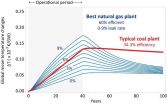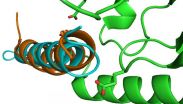Office jerks beware - your good ideas may not always be welcomed by colleagues
Being original AND disagreeable can backfire within a supportive group, say researchers
2014-12-08
(Press-News.org) You don't have to be a jerk to come up with fresh and original ideas, but sometimes being disagreeable is just what's needed to sell your brainchild successfully to others. However, difficult or irritating people should be aware of the social context in which they are presenting their ideas. A pushy strategy will not always be equally successful, warn Samuel Hunter of Pennsylvania State University and Lily Cushenbery of Stony Brook University in the US, in an article in Springer's Journal of Business and Psychology.
People are often labelled as jerks if they are disagreeable by nature, overly confident, dominant, argumentative, egotistic, headstrong or sometimes even hostile. It's widely touted in the popular press that being so direct and forceful was what made innovators such as Steve Jobs and Thomas Edison successful.
Hunter and Cushenbery wanted to test whether people with disagreeable personalities are more innovative, and if it helps them down the line to get their fresh ideas accepted and used. In their first study, 201 students from a large Northeastern university in the US completed personality tests before strategizing together in groups of three to develop a marketing campaign. In the second study, involving 291 people, Hunter and Cushenbery used an online chat environment to investigate how being in the presence of other creative and supportive colleagues helped people to share their ideas more freely.
The first study showed that people do not need to be jerks to have fresh ideas. However, such an attitude helps when you want to steamroll your ideas so that others will accept them. Findings from the second study highlighted how important the social context is in which new ideas are being shared. Hunter and Cushenbery established that being disagreeable helps when you want to push your new ideas ahead or when you find yourself in a situation that is not necessarily open to original thoughts or changes. This obnoxious attitude can, however, backfire if you are working within a supportive, creative group in which ideas are shared freely.
"It seems that being a 'jerk' may not be directly linked to who generates original ideas, but such qualities may be useful if the situation dictates that a bit of a fight is needed to get those original ideas heard and used by others," says Hunter in summarizing the results.
"Disagreeable personalities may be helpful in combating the challenges faced in the innovation process, but social context is also critical," elaborates Cushenbery. "In particular, an environment supportive of original thinking may negate the utility of disagreeableness and, in fact, disagreeableness may hamper the originality of ideas shared."
INFORMATION:
Reference: Hunter, S.T. & Cushenbery, L. (2014). Is being a jerk necessary for originality? Examining the role of disagreeableness in the sharing and utilization of original ideas, Journal of Business and Psychology. DOI 10.1007/s10869-014-9386-1
The full-text article is available to journalists on request.
ELSE PRESS RELEASES FROM THIS DATE:
2014-12-08
Washington, D.C.-- Natural gas power plants produce substantial amounts of gases that lead to global warming. Replacing old coal-fired power plants with new natural gas plants could cause climate damage to increase over the next decades, unless their methane leakage rates are very low and the new power plants are very efficient.
These are the principal findings of new research from Carnegie's Ken Caldeira and Xiaochun Zhang, and Nathan Myhrvold of Intellectual Ventures that compares the temperature increases caused by different kinds of coal and natural gas power plants. ...
2014-12-08
Washington, DC (December 8, 2014) - Scrolling through the comments section on a news site is like seeing a verbal war before your eyes. Internet trolls flourish in an anonymous world, so much so that sites like Reuters and Popular Science have done away with the comment sections altogether. But there has to be a better way to let the audience engage in a civil manner. A recent study published in the Journal of Computer-Mediated Communication by researchers at the University of Texas, Purdue University, and University of Wyoming, found that having a journalist engage with ...
2014-12-08
A technique that can identify causes of cancer invisible to genetic sequencing has uncovered large sets of previously unknown pancreatic cancer genes. It is hoped that this study will boost research into a disease that is still poorly understood and for which five-year survival rates have stood at around 5 per cent for the past four decades.
The technique works by introducing sections of DNA called piggyBac transposons into the mouse genome. Transposons jump around within the genome, reinserting themselves at random and causing a different mutation in each cell of the ...
2014-12-08
ITHACA, N.Y. - There is cloud hanging over climate science, but one Cornell University expert on communication and environmental issues says he knows how to help clear the air.
In the December issue of Nature Climate Change, Jonathon Schuldt, assistant professor of communication, argues that only by creating a "science of climate diversity" can climate science and the larger climate change movement overcome a crippling lack of ethnic and racial diversity.
"There is an invisible, but very real barrier to climate engagement," Schuldt said. "We need to engage with all ...
2014-12-08
A genetic misfire called the 3q26.2 amplicon can cause real havoc. In fact, it is among the most frequent chromosomal aberrations seen in many cancers, including ovarian and breast cancers.
Researchers behind a study at The University of Texas MD Anderson Cancer Center believe they may have found a molecule-based approach to halting 3q26.2's destructive nature. By manipulating a non-coding microRNA (miRNA) known as miR569 that is part of the amplicon, scientists were able to increase cell death in vitro and in vivo. MicroRNAs are short, non-coding RNA molecules that are ...
2014-12-08
Alexandria, Va. -- Methane is often found naturally leaking from the seafloor, particularly in petroleum basins like the Gulf of Mexico or along tectonically active continental margins like the U.S. West Coast, but such plumes were not expected along passive margins, like the East Coast of North America. Now, however, the discovery of hundreds of methane seeps on the seafloor along the U.S. East Coast suggests that such reservoirs may be more common along passive margins than previously thought. The release of such methane globally may have a significant influence on climate, ...
2014-12-08
BLOOMINGTON, Ind. -- A new treatment for adult-onset diabetes and obesity developed by researchers at Indiana University and the German Research Center for Environmental Health has essentially cured lab animals of obesity, diabetes and associated lipid abnormalities through improved glucose sensitivity, reduced appetite and enhanced calorie burning.
In preclinical trials, the new peptide -- a molecular integration of three gastrointestinal hormones -- lowered blood sugar levels and reduced body fat beyond all existing drugs, according to the work co-led by IU Distinguished ...
2014-12-08
Scientists from the Spanish National Cancer Research Centre (CNIO), led by Guillermo Montoya, have developed a method for producing biological crystals that has allowed scientists to observe --for the first time-- DNA double chain breaks. They have also developed a computer simulation that makes this process, which lasts in the order of millionths of a second, visible to the human eye. The study is published today by the journal Nature Structural & Molecular Biology.
"We knew that enzymes, or proteins, endonucleases, are responsible for these double strand breaks, but ...
2014-12-08
Sexual behaviour of teenage girls does not appear to be impacted by the human papilloma virus (HPV) vaccine, according to Queen's researchers Drs. Leah Smith and Linda Lévesque.
There are concerns the vaccine, which guards against four types of the HPV shown to cause cervical cancer and anogenital warts, may give girls a false sense of security about contracting sexually transmitted infections (STIs) and lead them to engage in riskier sexual activity.
"These findings suggest fears of increased risky sexual behaviour following HPV vaccination are unwarranted and should ...
2014-12-08
When cancer is diagnosed, the grade of its malignancy is a central concern for both patients and their physicians. This value is used to determine how intensively and how radically the cancer must be treated. Particularly in the case of prostate cancer, the disease can take widely varying courses in different patients. Therefore, cancer researchers have been looking for measurable, reliable biomarkers that give clues about the aggressiveness of a tumor in order to choose an appropriate therapy.
In many types of cancer, alterations in a tumor's genetic material indicate ...
LAST 30 PRESS RELEASES:
[Press-News.org] Office jerks beware - your good ideas may not always be welcomed by colleagues
Being original AND disagreeable can backfire within a supportive group, say researchers



